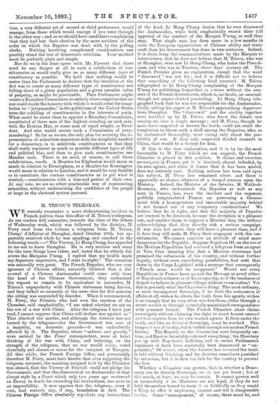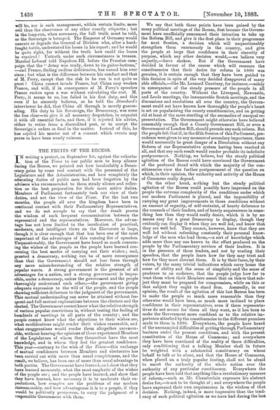M. TRICOU'S TELEGRAM.
WE scarcely remember a more disheartening incident in French politics than this affair of M. Tricou's-telegram. As our readers will remember, towards the close of the debate of Wednesday week, which was followed by the division, M. Ferry read from the tribune a telegram from M. Tricou, Charge d'Affaires at Shanghai, dated October 28th, but ap- parently received while he was speaking, and couched in the following words :—" The Viceroy, Li Hung Chang, has appealed to me not to leave Shanghai. He is very anxious and sorry for the turn things have taken, and states that he utterly dis- avows the Marquess T'seng. I replied that my health made my departure imperative, and I start to-night." The sensation was naturally very great. The French Deputies, who are very ignorant of Chinese affairs, naturally believed that a dis- avowal of a Chinese Ambassador could come only from the head of the Chinese Government, they understood the request to remain to be equivalent to surrender, M. Tricou's unpopularity with Chinese statesmen being known, and they talked so earnestly of the news that for five minutes the sitting was suspended by disorder. When it recommenced, M. Ferry, the Premier, who had seen the emotion of the Chamber, said emphatically, "I am asked whether we are on the eve of a war with China. After the telegram I have just read, I cannot suppose that China will declare war against us." This clinched the matter, and although the division was not turned by the telegram—for the Government was sure of a majority, on domestic grounds—it was undoubtedly affected by it. The Deputies, whose " sadness and gravity" were noticed by the Times' correspondent, were at heart thinking of the war with China, and believing, on the strength of the telegram, that no war would occur, voted cheerfully and almost en masse for the conquest of Tonquin. All this while, the French Foreign Office, and presumably therefore M. Ferry, must have known that even supposing the telegram accurate, the meaning assigned to it by the Chamber was absurd, that the Viceroy of Petcheli could not pledge his Government, and that the disavowal of an Ambassador in that abrupt style by a Court which only two years ago sentenced an Envoy to death for exceeding his instructions, was next to an impossibility. It now appears that the telegram, even if sent, bad scarcely any, if any, foundation in fact. The Chinese Foreign Office absolutely repudiate any instructions of the kind, Li Hung Chang denies that he ever disavowed the Ambassador, while both emphatically record their full approval of the conduct of the Marquis T'seng, as well they may. That single man has done more in a few months to raise the European appreciation of Chinese ability and state- craft than his Government has done in two centuries. Indeed, it is clear, from the communications made by the Marquis to interviewers, that be does not believe that M. Tricou, who was at Shanghai, even saw Li Hung Chang, who hates the French- man, and who was at Tientsin, three days' journey off. The French Premier gives no explanation, except that the word " disavowal " was not his ; and it is difficult not to believe that something of the following kind occurred : M. Tricou telegraphed to Li Hung Chang complaining of the Marquis T'seng for publishing despatches in extenso without the con- sent of the French Government, which is, no doubt, an unusual, though not unprecedented proceeding. Li Hung Chang tele- graphed back that he was not responsible for the Ambassador, civilly adding his regret at M. Tricou's approaching departure from Shanghai. The " disavowal" and the civility together were huddled up by M. Tricou, who knew the debate was coming on, into a single message ; and M. Ferry, though he must have suspected or known the truth, could not resist the temptation to throw such a shell among the Deputies, who, as he understood thoroughly, were caring only about the pos- sibility of war. If they only suspected divided counsels in China, that would be a victory for him.
If this is the true explanation, and it is by far the most favourable to M. Ferry which we can suggest, the French Chamber is placed in this position. It claims and exercises sovereignty in France, yet it is deceived, almost befooled, by its own agents, and when it learns that it has been misled, does not seriously care. Nothing serious has been raid upon the subject, M. Ferry has remained silent, and there is apparently no chance whatever of a formal censure upon the Ministry. Indeed, the Minister of the Interior, M. Waldeck- Rousseau, who understands the Deputies as well as any man in France, has, since the incident and the exposure, publicly congratulated France on possessing a Govern- ment with a homogeneous and immovable majority behind it not formed out of any temporary combinations! We believe that he is right, and that the majority of Deputies are content to be deceived, because the deception is a pleasant one, and enables them to support a Minister they like without acknowledging that they thereby risk a serious campaign. If war does not arrive they will have a pleasant time, and if it does they will make M. Ferry their scapegoat with the con- stituencies. We cannot conceive an attitude of mind more dangerous for the Republic. Suppose Napoleon III. on the eve of the Mexican Expedition had received a telegram from an agent at Vera Cruz assuring him that a Mexican statesman had promised the submission of his country, and without further inquiry, without even considering possibilities, had sent that down to the Corps Iaigislatif with a message that consequently "French arms would be unopposed." Would not every Republican in France have quoted the Message as proof either of Napoleon's wiliness, or of his incapacity, or of the readiness of despots to believe in pleasant tidings without examination? Yet this is precisely what the Chamber is doing. The most ordinary, or even incompetent Sovereign, if he feels the seriousness of affairs at all, wishes to obtain the truth from his agents, wishes it so strongly that he very often watches them, either through a secret service or through a carefully maintained correspondence with personal friends. The French Chamber alone claims
sovereignty without claiming the right to exact honest counsel and true reports from its own trusted agents. It frets under the
truth, and like an Oriental Sovereign, must be soothed. This temper is not of to-day, but is visible throughout modern French history. The Reports to the Convention were frequently un-
true, and Barri.re invariably coloured everything ; the Directory put up with Napoleon's bulletins, and in recent Parliaments exposures of facts have repeatedly been denounced as " un- patriotic." Of course, when the disaster has occurred the truth is told without flinching, and the deceiver sometimes punished by ostracism, but it is then too late for the country to prevent the loss.
Whether a Chamber can govern, that is, whether a Demo- cracy can be directly Sovereign, we do not yet know ; but of
this much, at least, we may be certain. It cannot govern well or successfully if its Ministers are not loyal, if they do not hold themselves bound to treat it as faithfully as they would
a King, to offer it unpleasing counsel and tell it disagreeable truths. Some "management," of course, there must be, and will be, nor is such management, within certain limits, more evil than the observance of any other courtly etiquette ; but in the long-run, when necessary, the full truth must be told, or the Sovereign is betrayed. The Emperor of Germany would execute or degrade the General of Division who, after a hard- fought battle, understated his losses in his report ; and he would be quite right, for without the truth how could the losses be repaired ? Untruth under such circumstances is treason. Marshal Lebceuf told Napoleon III. before the Prussian cam- paign that the " Army was ready, down to its gaiter-buttons," —and France, finding endless deficiencies, has cursed him ever since ; but what is the difference between his conduct and that of M. Ferry, except that the risk to be run is not quite so great ? China cannot invade France, but China may weaken France, and will, if in consequence of M. Ferry's speeches France rushes upon a war without calculating the cost. M. Ferry, it seems to us, has failed in his first duty, and this even if he sincerely believes, as he told the Standard's interviewer he did, that China all through is merely gascon- ading. His duty to his Sovereign, the Democracy, was none the less clear—to give it all necessary despatches, to acquaint it with all essential facts, and then, if it rejected his advice, either to retire from a discredited post, or to accept the Sovereign's orders as final in the matter. Instead of this, he has, cajoled his master out of a consent which events may prove to have been nearly ruinous.



































 Previous page
Previous page